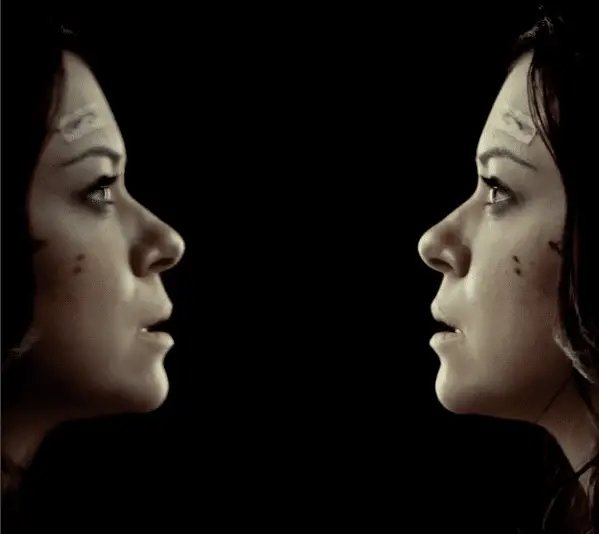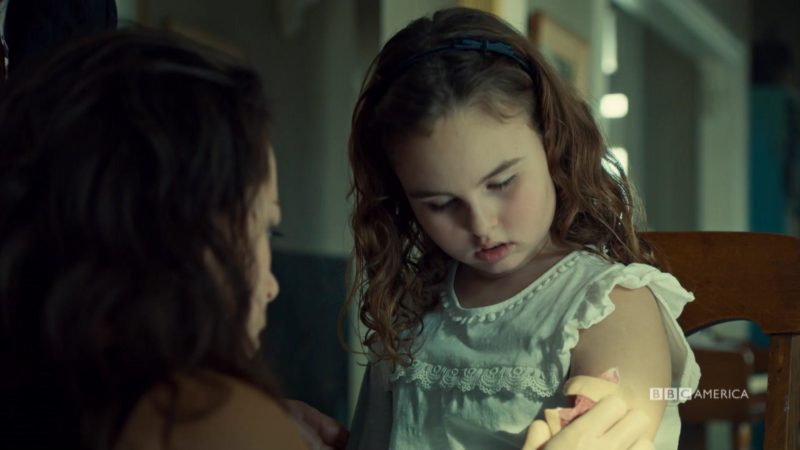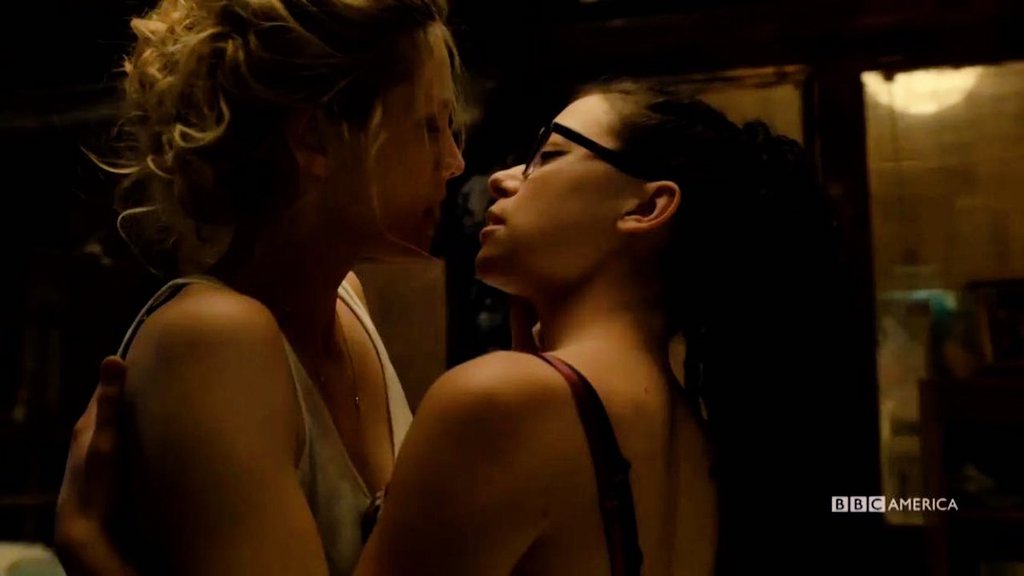This article contains major spoilers for all aired episodes of Orphan Black as well as for The Island of Doctor Moreau by H.G. Wells.
The Island of Doctor Moreau has been woven into the Orphan Black narrative since season 2, when Ethan Duncan appeared. His mysterious old copy of the 1896 H.G. Wells sci-fi/horror novel was eventually revealed to contain some kind of special code, or “the key,” describing the Leda genome. This key was ostensibly written in a special language that only he and Rachel understood. After his suicide, it was a source of plot tension that forced one of a string of uneasy alliances between Rachel and her sestras, in this case chiefly Sarah and Cosima, with heavy help from (honorary brother sestra) Scott. He was, in reality, doing pretty much all of the work translating this “key” until it was stolen by Rudy.
Of course Cosima had made a copy, which in turn carried the Drama of The Book into new territory when she kept it a secret from Delphine. (Oh the tortured Cophine love, it mauls my heart). Eventually, translating the secret code was a moot point, because the clone squad discovered Kendall Malone, the “Original,” aka the source of both Castor and Leda genomes. She carried the silver bullet to a cure for the clone disease until she was murdered and torched by Detective Duko/Evie Cho in another scene involving Heartbreaking Drama™ on all the levels.
It may seem like The Island of Doctor Moreau, or at least the copy which contained this “key,” had lost its potential to help the sestras. At this point in the story, Rachel was gone (on basically the same island, in fact, but we’ll get to that) and all of Cosima and Scott’s work had been wiped by Evie’s Trojan horse. They were out of time and minus the one person who could translate. But, it turns out that despite the fact that Duncan’s key really didn’t have much potential anymore as far as curing the clone disease, The Island of Doctor Moreau itself has become more relevant than ever as we hurtle through the final season of Orphan Black. Now, it’s not the secret made-up language that guides the sestras (or more importantly, the viewers) through the final trip, but the contents of the novel itself.

Since the plot of Orphan Black was obviously headed in this direction, I grabbed a copy of the book and read it myself.
You don’t need to read The Island of Doctor Moreau to understand that it grapples with the same themes of bioethics and what it means to be human as Orphan Black does. In the novel, Dr. Moreau is an exiled scientist and the sole inhabitant of an off-the-map tropical island until he is joined by a man named Montgomery. They are joined by the narrator, Edward Prendick, after he is lost at sea in a shipwreck and reluctantly rescued by Montgomery, who was on his way back to the island from procuring several animals in cages (rabbits, a puma, etc).
Dr. Moreau has devoted his life on the island to attempting to turn “beasts” into humans, or more specifically, performing vivisection on animals in order to make them more human. He defines “human” quite narrowly, like having the ability to speak. But when he gets into the territory of getting his “beasts” to think and act like humans, the doctor (and the book itself) struggles with what that really means. “You see, I went on with this research just the way it led me,” Dr. Moreau says. “I asked a question, devised some method of obtaining an answer, and got a fresh question.” Sound familiar? He follows the crazy science; science is poking at things with sticks. (Both Cosima-isms).
The island is also inhabited by the Beast People, i.e. the “failed” iterations of Dr. Moreau’s experiments over the years. Prendick uses incredibly racist language to describe them as repulsive, horrifying and stupid. He fears them, and yet he also fears Moreau and his twisted morals and methods. Moreau explains himself and his scientific drive to Prendick:
“…we find the promise of a possibility of superseding old inherent instincts by new suggestions, grafting upon or replacing inherent fixed ideas…of what we call moral education is such an artificial modification and perversion of instinct…”
He literally says that morality is artificial, a perversion of instinct. If P.T. Westmoreland is Orphan Black‘s Dr. Moreau (which, let’s face it, he totally is), this does not bode well.
Moreau fears his creations, and they fear him. This fear on both sides is definitely also happening in Orphan Black, too. Moreau has instilled in the Beast People something called the Law, which they ritually chant and includes things like not eating meat and fearing the House of Pain, i.e. Moreau’s camp/house where he performs experiments. On Westmoreland’s island, the “monster” and Revival also fear each other; on a larger scale, the clones fear Neolution relentlessly hunting them, yet they are a real threat to Neolution at the same time. The man at the top cannot actually control what beings with agency will do, no matter how much he fancies himself their creator and god.
In episode 1 of this season, “The Few Who Dare,” Sarah is attacked by the unknown “monster” in the woods of Westmoreland’s island. In episode 4, “Let the Children and Childbearers Toil,” Cosima snoops around Westmoreland’s basement and finds a distinctly Moreau-ish space containing broken shackles and blood stains on the walls.
We also learn from Virginia Coady (who’d have thought we’d see her again, am I right?) that before the human cloning experiments even began, Westmoreland recruited her and Susan to come to his island—a cold northern island rather than the hot tropical one of Dr. Moreau—and help him perform experiments on a child with a unique genome in order to advance the “perfection” of the human race. The goals and methods they employed to do this vague thing are still a mystery, but the child became the “monster” who is loose on the island and whom all of Revival fear.
The parallels smack you in the face. Turning “beasts” into humans, altering evolution, eugenics—they’re cut from the same cloth, or rather, strand of DNA. There are too many questions about what the goals of Moreau or Westmoreland are: to stave off mortality? To control nature? To wipe out “undesirable” traits from “beasts” or humans? These all seem, from the self-important Moreau/Westmoreland perspective, to be rooted in ideals. But the morality of these ideals is problematic at best, evil at worst.
Take this quote from Dr. Moreau:
“Oh, but [pain] is such a little thing! A mind truly opened to what science has to teach must see that it is a little thing… Why, even on this earth, even among living things, what pain is there?… I never heard of a useless thing that was not ground out of existence by evolution… And pain gets needless.”
To prove his point to Prendick, Moreau cuts himself with a penknife. Kira literally does the same thing in episode 3, “Beneath Her Heart.” Clearly Westmoreland’s house was a House of Pain for our as-yet-unknown woods-monster in Orphan Black as well. In the show, much has been made of regeneration. Rachel goes on about the ability of spiny mice to regrow skin and tails, perhaps deliberately planting the idea of self-harm into Kira’s mind as a test of her own regenerative powers.

Kira’s nearly instant recovery from being hit by a car in season 1, and her mysterious psychic connections to all of the sestras, have marked her as special from the start. Helena’s “miracle babies” clearly possess similar traits to Kira’s, after showing no sign of injury from being impaled with a stick through Helena’s belly.
Even Rachel’s recovery from her brain injury, as well as her eye (will we learn more about this eye ever?), parallel the Moreau narrative of overcoming “petty” things like pain in order to pursue something greater. Such could be the case for the immortality at the core of Revival, or the… taming? control? humanizing? of animals that characterizes Moreau’s quest for scientific nirvana, or something. (Honestly there’s a lot of thinly veiled racism in this book. It’s in the language and it’s in the repeated references to Moreau’s powdery-white skin vs. the dark “beast” skin and it’s in the class roles on the island. It’s hard to read.).
Our clone heroes are only one part of a vast experiment that has sprawled over many public and private entities within the narrative of Orphan Black. The splintered and expansive nature of these Neolution-rooted factions reflect the endless questions that pop up as soon as one begins to consider the intentions and morals behind controlling human evolution. Seemingly, there are benefits to knowing too much about human genomes and how to alter them: elimination of disease, greater choice in when one dies. But quickly, we are faced with quandaries about selecting for very subjective traits that are “desirable,” or what it would mean to live forever, or who is included and excluded from these technologies. Quickly, we’ve arrived at eugenics, and that is not a good place to be.
On Dr. Moreau’s island, one of the things that troubles him so much is how the Beast People revert to their beast natures over time. He can only control them so much. He ends up being murdered by his own creations. As Prendick recounts what happens over the following several months, we learn that this reversion becomes more or less complete before he finally escapes the island.
We also learn that the “women” beasts (because of course they have genders) are the first to revert, to lose their sense of “decorum.” Because the patriarchy.
This could be a good allegory for the sestras, only subverted/adapted for a new setting. The sestras are, after all, not Beast People in the same way that the “monster” on Westmoreland’s island or the Beasts on Moreau’s island are. They were not altered after birth; they were created. Their “reversion” could mean curing themselves of their disease, wiping out the most painful way in which Neolution has marked them.
Maybe they’ll also kill Westmoreland, which I would be totally fine with. Then they can live as they truly want to: free. (And with Delphine, I’m talking about with Cosima). Also, they’re women, which is probably why they have already lost their “sense of decorum” and have been fighting Neolution for a while, unlike the Castors who were gross and did everything in service to their master(s).

On Moreau’s island, it doesn’t take long for Prendick to question his own ideas of humanity, to grow increasingly confused and twisted up. One night, he sees the Beast People and thinks,
“A strange persuasion came upon me, that, save for the grossness of the line, the grotesqueness of the forms, I had here before me the whole balance of human life in miniature, the whole interplay of instinct, reason, and fate in its simplest form… Now they stumbled in the shackles of humanity.”
Prendick, like the novel itself, like our beloved Orphan Black, is asking: what is human?
The Island of Doctor Moreau ends with Prendick escaping the island and being rescued, but he is forever changed. He returns to the world only to live as a recluse because all he can see in his fellow humans is beasts.
“With my return to mankind came, instead of that confidence and sympathy I had expected, a strange enhancement of the uncertainty and dread I had experienced during my stay upon the island… I was almost as queer to men as I had been to the Beast People… They say that terror is a disease…”
Prendick had gone too far down the rabbit hole, like Moreau and Montgomery before him. Humans became beasts, and beasts became humans. If morality is at least part of what makes us human, Moreau was the real beast, and so is Westmoreland and all of Neolution. One of the most important questions that will remain, when the dust eventually settles at the end of this season, is how the sestras and their kin will confront what they’ve been through, and how they will inhabit themselves, their humanity and the world when they are free from their Dr. Moreau.
“The study of Nature makes a man at last as remorseless as Nature,” says Moreau in the novel. Westmoreland and his die-hard allies (like Susan and Virginia) can’t bounce back from the remorseless path they’ve blazed.
Maybe Ethan Duncan’s key was not a key to the Leda genome at all, but a key to freedom based on the Dr. Moreau story. To quote Cosima in one of the season 5 teasers: “I can almost taste freedom… [but] not yet.”
The Drama of the Book continues, and I, for one, am excited to see where it goes.

